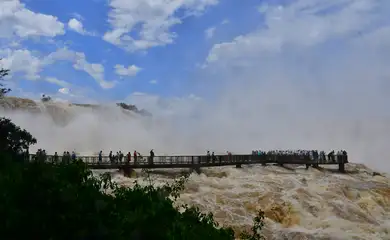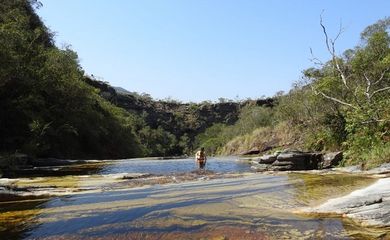Brazil yet to harness its full potential for adventure travel

Boasting an 8,500-kilometer coastline, a tropical climate, and favorable conditions for outdoor activities all year round, Brazil has the potential to become a great exponent in adventure travel, which, along with ecotourism, makes up nature tourism.

That is what experts heard by Agência Brasil said on World Tourism Day, celebrated Wednesday (Sep. 27). They believe, however, that, in order to meet this goal, the country needs to improve its infrastructure, guaranteeing safety and well-being for visitors, as well as investing more in publicizing its natural assets.
Vinicius Viegas, head of the Brazilian Association of Adventure Tourism Companies (Abeta), said he is witness to the general public’s growing interest in nature tourism. Even so, like the others experts interviewed, he argued that Brazil is not taking advantage of all the possibilities the segment offers.
“This increase is still far below our potential. It’s not the result of a strategy to publicize the various activities that tourists can experience when visiting the country. When it comes to sports tourism, foreign interest is much more strongly linked to the evolution and visibility that each sport has attained among its practitioners,” said Viegas, a mountaineer and owner of a travel agency specializing in the sector.
He mentioned the example of the Rota das Emoções (“Emotions Route”), which connects the states of Ceará, Piauí, and Maranhão. “Today, kitesurfers from all over the world dream of one day visiting and sailing through the region,” he added, highlighting the strong competition between the main global tourist destinations.
“In this sector, success hinges on a combination of factors. Let's face it, there are mountains, waterfalls and forests of all kinds all over the world. That’s why it’s necessary to convey a sense of security and invest more in promotion. Because, apart from a few classic destinations nearly every sportsman would love to visit—like Hawaii for a surfer—picking a destination involves various aspects, such as public safety, transport infrastructure, accommodation, costs, food. Everything’s a factor, even language difficulties.”
“There’s no arguing when it comes to Brazil’s potential and immense vocation for sports and adventure tourism, but there’s still a need for integrated, strategic work to showcase Brazil in this way abroad,” said Ana Clevia Guerreiro, Tourism Coordinator at the Brazilian Micro and Small Business Support Service (Sebrae).
“Brazil is a sensational country for activities linked to adventure and sports tourism. Sadly, this potential is still not well exploited, and the subject is little explored by the public authorities, the market, and academia,” Ricardo Ricci Uvinha, director of the School of Arts, Sciences, and Humanities at the University of São Paulo (USP), a specialist in leisure and tourism, added.
Yrwana Albuquerque Guerra, Ceará’s Secretary of Tourism, said the country is still “a little child in this lucrative segment.” “We need to make a name for ourselves as a country conducive to action sports and ecotourism and make this known to the world,” she argued.
Ceará is often highlighted as a role model in the promotion of tourist potential for action sports, like kitesurfing.
Adventure sports
Athletes such as seven-time world champion Mikaili Sol, four-time champion Carlos Mário “Bebê,” and three-time champion Bruna Kajiya have helped spread the word among kiteboarders that Brazil, especially the northeastern coast, is a privileged place to practice the sport, with remarkably favorable conditions most of the year.
Another adventure sport with the potential to project Brazil’s vocation abroad is surfing. Between 2014 and 2023, four Brazilian surfers—Gabriel Medina, Adriano de Souza “Mineirinho,” and Filipe Toledo, from São Paulo; and Ítalo Ferreira, from Rio Grande do Norte—won seven of the nine world championship titles contested during the period, garnering fans of the sport worldwide.
Medina alone has over 11 million followers on one of his social network pages. Ferreira, who made history again in 2021 by becoming the sport’s first Olympic champion, boasts 2.8 million. Ferreira also starred in a successful show on a pay-TV channel in which he helped make the beauty of the waves in his hometown of Baía Formosa famous to an audience not restricted to surfing.
The success of these and other Brazilians in action sports—such as six-time world bodyboarding champion Guilherme Tâmega and Olympic medal-winning skateboarders Kelvin Hoefler and Rayssa Leal—brought a great deal of positive publicity to Brazil. However, it was not enough to attract more international visitors interested in the conditions in which our world champions were trained.
Visibility
Brazil’s tourism authority Embratur, tasked with promoting the country’s attractions abroad, plans to boost investment in efforts to attract sports and adventure tourists to the country. Some initiatives have been set in motion, as the agency’s Nature and Special Segments Coordinator Leonardo Persi pointed out.
“We intend to be present at national and international events and once again promote the Brazil brand [among sportspeople and foreign audiences],” Persi explained. As an example, he cited the World Adventure Travel Summit—which the main representative body for ecotourism companies on the planet, the Adventure Travel Trade Association (ATTA) held this month in Japan. He also talked about the XP Sertões Kitesurf, the largest long-distance kitesurfing race, which brought to Ceará this month competitors from the UK, France, Turkey, Portugal, Switzerland, the Dominican Republic, and Argentina, as well as Brazilians from various states.
“We also plan to get closer to renowned athletes, journalists, and digital influencers in a bid to give more visibility to adventure destinations in the country,” said Persi, returning to the debate about why Brazil, with so many world champions across different sports, fails to attract more action sports enthusiasts.
“It’s obvious that athletes like [cyclist] Henrique Avancini, multi-athlete Karina Oliani, and others who carry Brazil’s brand around the world have the potential to boost sales of adventure activities in the country. But it’s not enough to have the name of a great Brazilian athlete to attract the [international] public if they arrive [in the country] and there isn’t a minimally adequate structure to serve them,” Persi argued.






